IOS felicitates newly-elected president and office-bearers of All India Muslim Personal Law Board
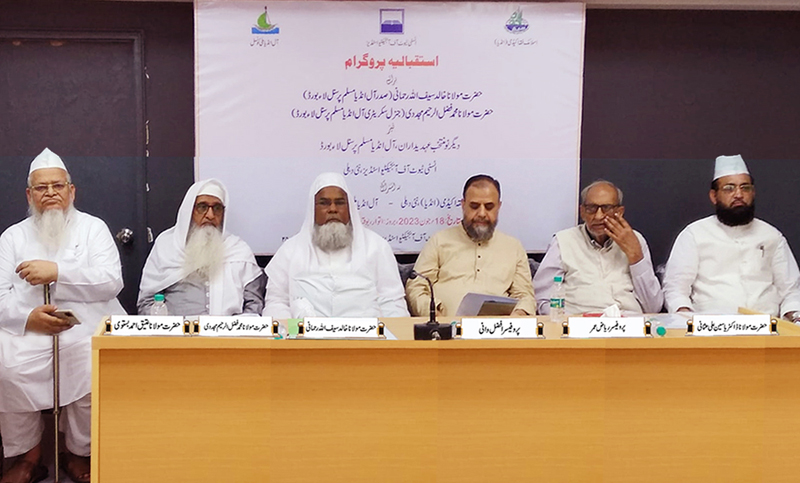
IOS felicitates newly-elected president and office-bearers of All India Muslim Personal Law Board
New Delhi: A function to felicitate the newly-elected president of All India Muslim Personal Law Board (AIMPLB), Maulana Khalid Saifullah Rahmani and other office-bearers, was organised by the Institute of Objective Studies (IOS), in association with the All India Milli Council (AIMC) and Islamic Fiqh Academy (IFA) at the auditorium of the Institute on June 18, 2023.
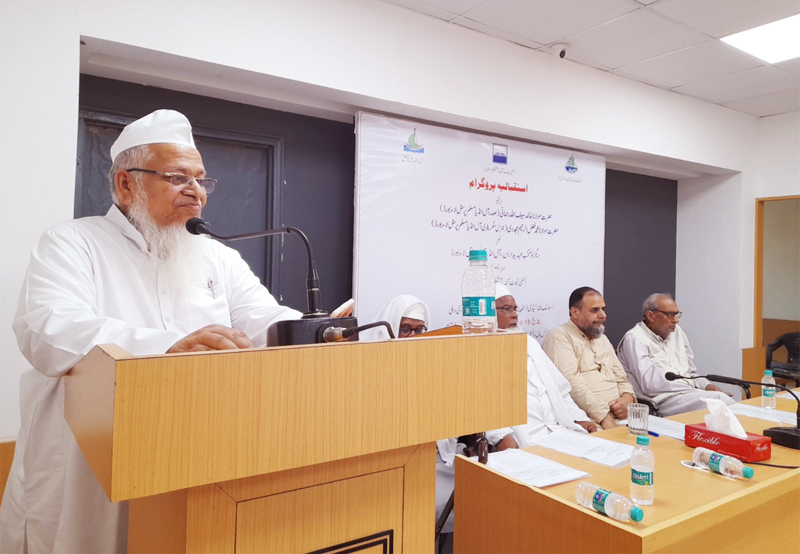
Secretary, Academic Affairs, Islamic Fiqh Academy, Maulana Atiq Ahmad Bastavi, in his address, expressed happiness that Maulana Khalid Saifullah Rahmani was unanimously elected president of AIMPLB and called for self-introspection. He said that the voice of the Board was considered as the voice of Indian Muslims. It was composed of all the sects of Muslims, be it Deobandi, Ahle-Hadith, Bareilvi, Shias and Sunnis, both. The new incumbent had big challenges before him to contend with. Thus a great responsibility had now devolved on him. Hailing the endeavours of the IOS, he termed it as the spinal cord of the Millat.
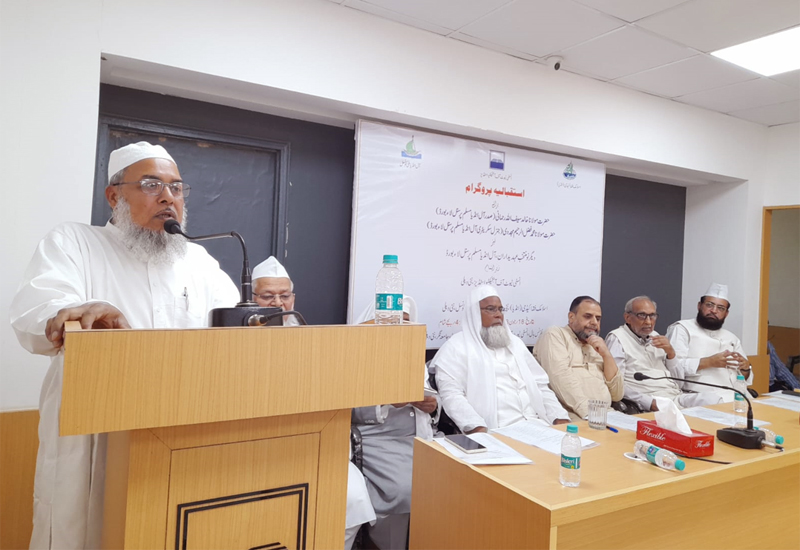
Vice-president of the All India Milli Council, Maulana Aneesur Rahman Qasmi, described the Board as the most powerful forum of Muslims in India. This represented every section of the community and provided leadership to Muslims as and when needed. The president of the AIMC, Maulana Hakim Abdullah Mughesi, who could not make it to the function, was represented by his son, Maulana Abdul Malik Mughesi. He read out the message of his father.
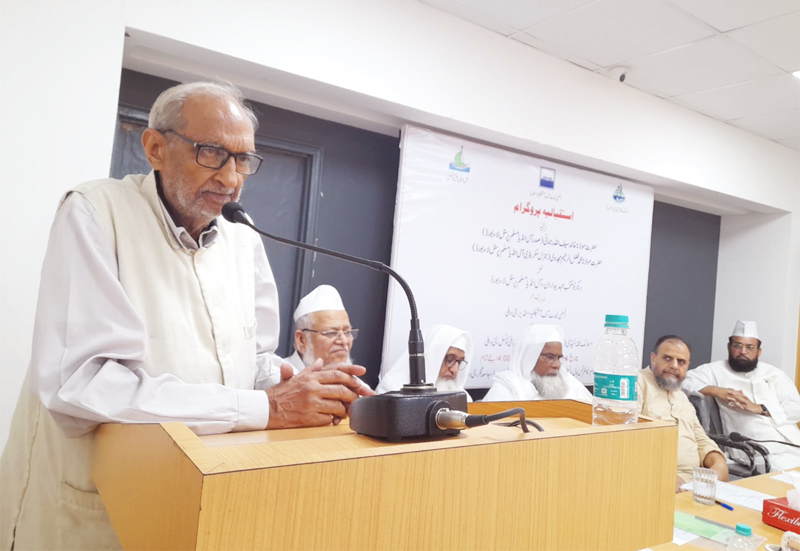
Prof. Riyaz Umar, treasurer of the AIMPLB, stressed the need for giving respect to the living Muslim scholars. They should be suitably honoured in recognition of their services.
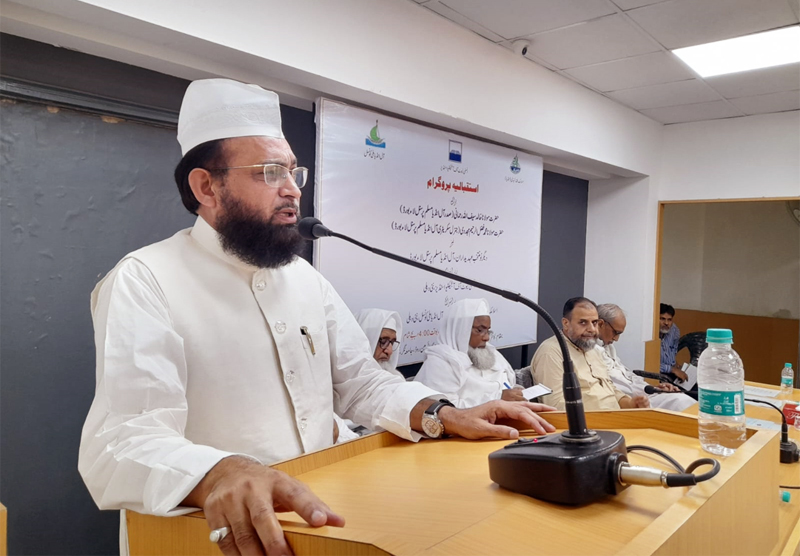
Newly-appointed secretary of the AIMPLB, Maulana Dr. Yasin Ali Usmani Badauni, pointed out that the Board was a composite organisation which represented all the schools of thought. Referring to his visit to Libya a few years ago, he said that several ulema of that country evinced keen interest in the Board and enquired from him about the activities of it. He urged the young Muslims to spare some time from their busy schedule for the cause of the Millat and do voluntary work.
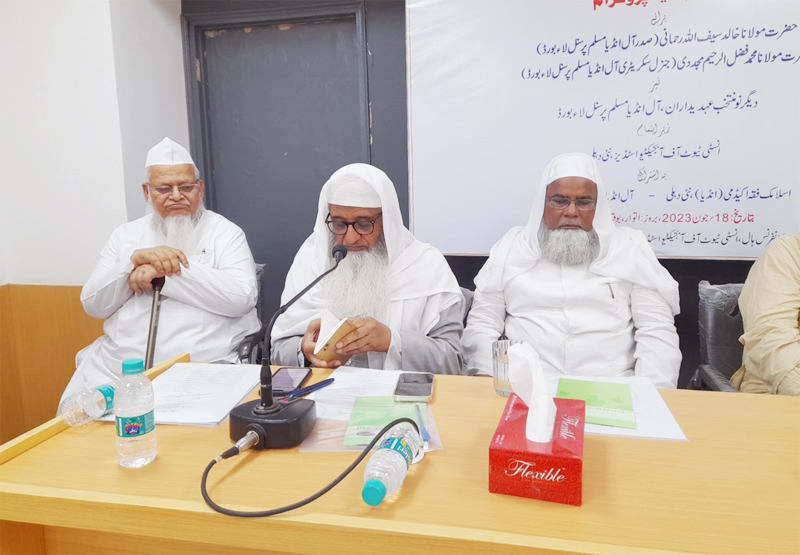
The new general secretary of the AIMPLB, Maulana Fazalur Rahim Mujaddidi, held that in 2005, the United Nations passed a resolution to which India was also a signatory, to abolish all personal laws. Main target of the resolution was Islam and its Shariah laws. They treated Islam as danger to Western civilisation. They wanted to enforce Western civilisation which was anti-Allah. The resolution was also against Jewish personal law but Jewish lobby was not vociferous about it. He said that the resolution was against all the religions. This resolution percolated down to the subordinate and local judiciary. Underlining the importance and the necessity of Darul Qaza, he said that as many as 87 Darul Qaza courts had been set up by the Board and they were functioning normally. He urged the Muslims to honour the decisions of Darul Qaza.
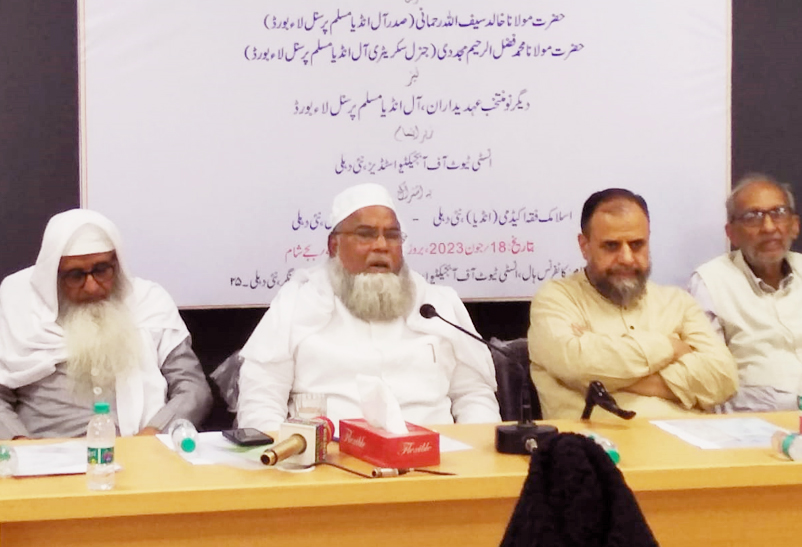
In his address, Maulana Khalid Saifullah Rahmani, newly-elected President of the Board said that such felicitation programmes were organised to give inspiration to achieve targets. This inspiration was an inner strength that gave courage to move ahead. He acknowledged the faith reposed in him by the community and thanked those who organised the programme in his honour, on his behalf and on behalf of other office-bearers of the Board. Listing his priorities, he said that the foremost among them would be to take the message to all sections of the community that the current fight was not between Hindus and Muslims. The fight, in fact, was between those who professed religion and those who did not believe in religion. He noted that the fight was not against Islam alone; it was against Hinduism as well. He informed that such lawyers who had Muslim bent of mind would be included in the legal team of the Board. He asked the Muslims to lead their lives according to Shariah. They should also stick to Shariah law in matters of marriage and divorce, he said.
Maulana Saifullah Rahmani held that Darul Qaza courts were functional throughout the country and the Muslims should take advantage of them. He urged Muslims to take part in the activities of the Board. Emphasising the need for 2-3 more secretaries, he said that Eastern states would be given more representation on the Board. He insisted that the shortcomings in the Board would be rectified: Khanqahs too had been represented by making Pasha Saheb the vice-president of the Board. Similarly, well-known journalist, Qasim Rasool Ilyas had been made the spokesperson of the AIMPLB. Efforts were also being made to accommodate other members in different committees of the Board. Reform in Muslim society was another issue which required urgent attention. With a view to ensuring the applications of Islamic law, more and more Muslims should turn to Darul Qaza for decisions in civil matters. He stressed that the unity of the Ummah should be maintained at all costs. He advised against being frightened. Trials and tribulations were not new to the Muslims as they faced incidents like mob-lynching and economic boycott during the lifetime of the Prophet (PBUH) also. He confidently stated that Muslims would emerge stronger after this challenge too.
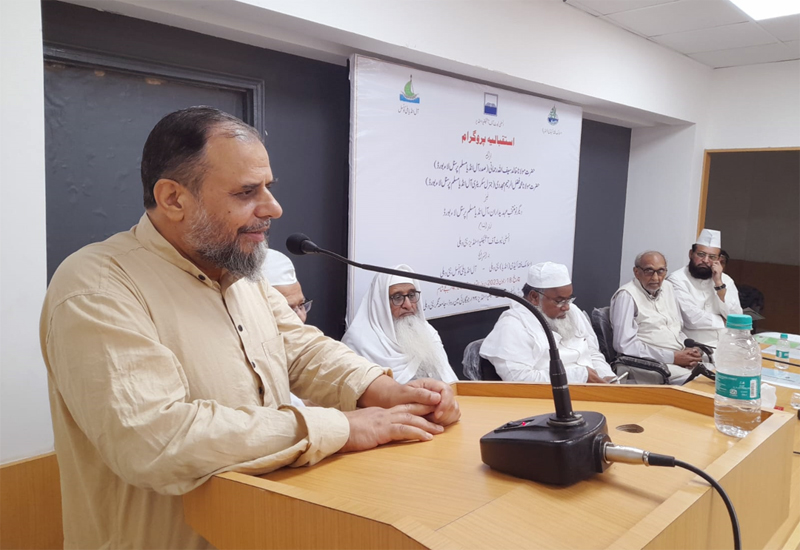
Presiding over the function, vice-chairman of the Institute, Prof. M. Afzal Wani, emphasised that the organisation was a big strength of Islam. Describing AIMPLB as a historical and valuable body of Muslims in India, he said that its main agenda had been to keep the Ummah united and strive for the protection of familial laws as per Shariah. The organisation could gain more strength if members of the community actively associated themselves with it. A sense of responsibility should guide Muslims to create organisations for the good of the community, he concluded.
Earlier, the function began with the recitation of a verse from the Holy Qur’an by Maulana Adnan Ahmad Nadwi.
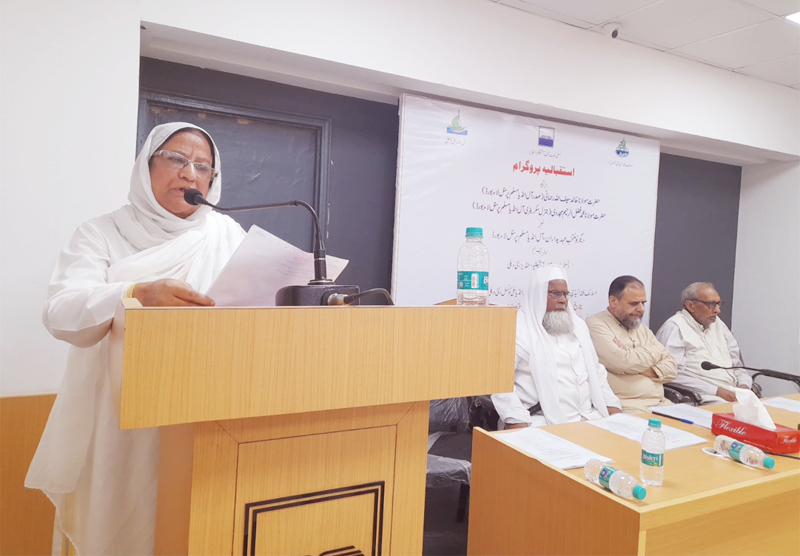
Prof. Haseena Hashia, the assistant secretary general of the IOS, in her welcome address, briefly highlighted the activities of all the three organisations. She said that the IOS was engaged in research on the issues relating to problems and placement of minorities in general and Muslims in particular. The focal areas also included identification and development of models suiting Indian masses, particularly, the poor, marginalised and deprived sections. The institute successfully completed more than three decades of its existence with steady progress and widening the scope of its endeavours as a non-political and non-profit organisation. It gained recognition in all relevant quarters at national and international plane for promoting research, conducting surveys on relevant themes, publishing books and journals in areas of national concern and pressing challenges of civil societies, awarding scholarship to meritorious university scholars, actively participating in social, welfare, educational and management fields. Besides, the institute organised conferences, seminars, symposia and workshops. Referring to the Islamic Fiqh Academy, Prof. Hashia said that it was established by the noted Islamic scholar, Qazi Mujahidul Islam Qasmi in 1999 in order to present Islamic view on different issues in the light of the Quran and Hadith.
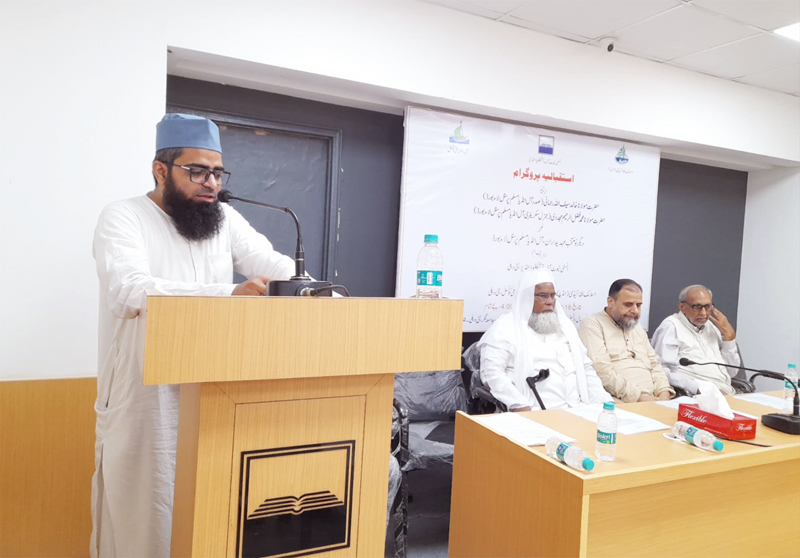
While the proceedings of the function were conducted by Maulana Shah Ajmal Farooq Nadwi, in-charge of the Urdu section of the IOS, Mufti Ahmad Nadir Al-Qasmi from IFA extended a vote of thanks.
The chairman of the Institute, Dr. M. Manzoor Alam attended the function in on-line mode due to his ill-health. It was at his instance that the felicitation function was organised. The occasion was marked by the presence of prominent Islamic scholars from across the society such as Prof. Mohsin Usmani, Maulana Abdul Hameed Nomani, Mohammad Ahmad and Malik Motasim Khan from Jamat-e-Islami Hind, Dr. Parvez Mian, Mr. Shakil Shamsi, Master Abdul Mubeen, Dr. Ilyas Saifi, Anjum Naim etc.
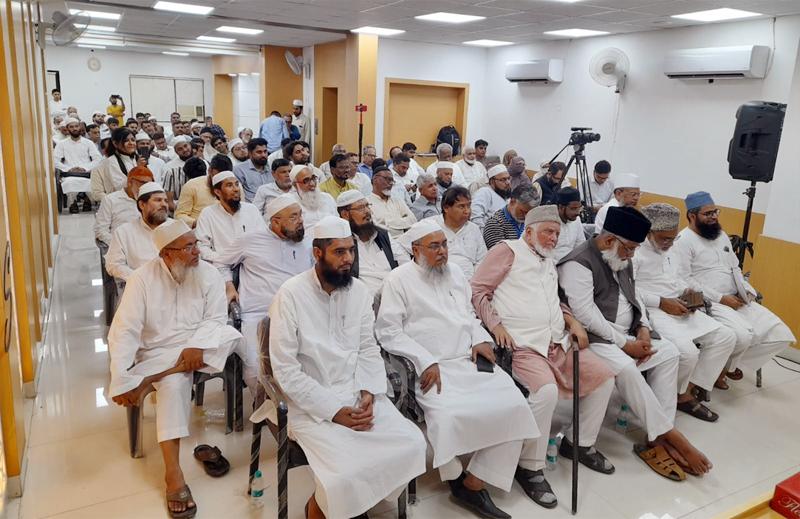
A view of audience
Go Back